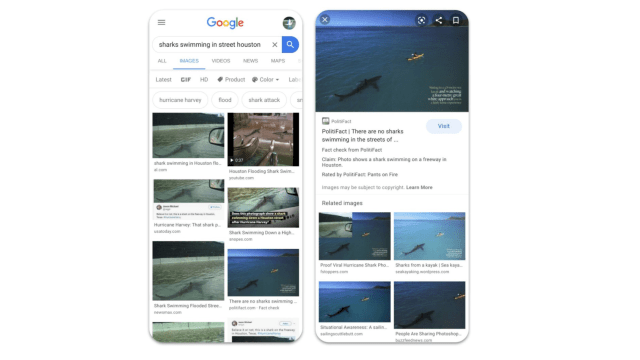Misinformation is rampant online, but while it’s pretty easy to debunk a spurious article or rumour, it can be a bit harder to fact-check images. To fix that, Google says it’s adding information to help users fact-check images found via a Google Images search.
When you rifle through thumbnails on Google Images, you might come across a “fact check” label. Tapping the result will bring up a larger version of the image, along with a summary of whatever claim may be associated with the image itself or the article it accompanies. For instance, the example image in Google’s blog shows a claim regarding a photo of a shark supposedly swimming through the streets of Houston. Underneath it is information about the claim, and whether or not it’s true.
[referenced url=”https://gizmodo.com.au/2020/05/twitter-adds-fact-check-to-trumps-conspiracy-theories-on-voter-fraud/” thumb=”https://gizmodo.com.au/wp-content/uploads/2020/05/27/kvo7gc09gdjdcmccfoq2-300×169.jpg” title=”Twitter Adds Fact Check to Trump’s Conspiracy Theories on Voter Fraud” excerpt=”Twitter, amid a controversy over its inaction on Donald Trump’s baseless tweets asserting that MSNBC host Joe Scarborough is a murderer, has for the first time begun attaching fact-checking links to some of the president’s posts.”]
It’s a decent idea, though there are a few questions. Like, who is providing the fact-checking? Google’s blog says the labels will appear on results from “independent, authoritative sources on the web that meet our criteria.” That “criteria” is the same as the fact-check information Google uses for fact-checking in search and Google News. Basically, labels should include the publisher of the fact check, the claim itself and the party behind it, and a summary of the results. Google also notes that a publisher’s trustworthiness is “determined by an algorithm” and that Google itself “does not endorse any of these fact checks.” As with Search and Google News, the blog says Google will again be using ClaimReview, a tagging system used by publishers to identify fact check content to search engines, apps, and social media platforms.
It might take a bit before you start seeing fact check labels in image searches, even though Google said it began global rollout yesterday. I ran a few searches of debunked fake images — including the Houston street sharks — but they didn’t return any fact check labels.
It’ll be interesting to see if Google’s fact-checking attempts will fare better this time around. In January 2018, Google rolled out hoaxes floating around about the novel coronavirus and the forthcoming 2020 general election.
